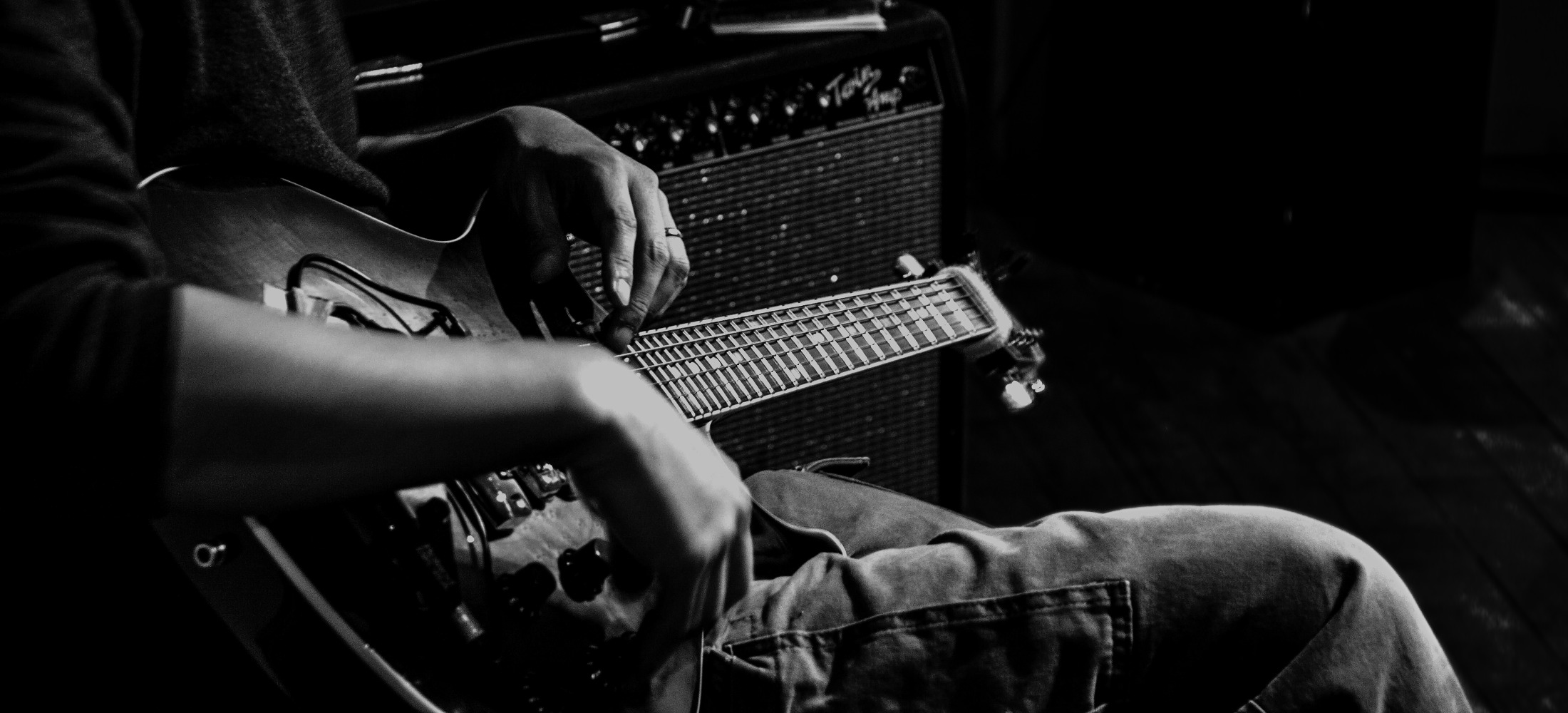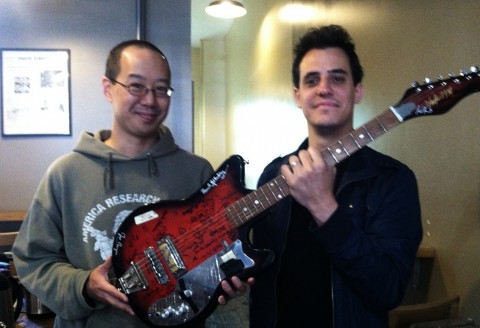
After recording my sixty-seven second ditty for the $100 Guitar Project, the instrument gets handed over to Taylor Levine. [About my track…] [more about this project…]
performance: Mark Hanslip, Dominic Lash, Phillip Marks and Han-earl Park at The Oxford, London

Monday, May 7, 2012, at 9:00pm (doors: 8:30pm): a performance by Mark Hanslip (saxophone), Dominic Lash (double bass), Phillip Marks (drums) and Han-earl Park (guitar) presented by Jazz @ The Oxford takes place at The Oxford (256 Kentish Town Road, London, England). Admission: £5.
See the performance diary for up-to-date info. [Jazz @ The Oxford listings page…] [facebook event…]
updates
04–30–12: add facebook event page.
performance: Numbers (Richard Barrett and Han-earl Park), Scarborough
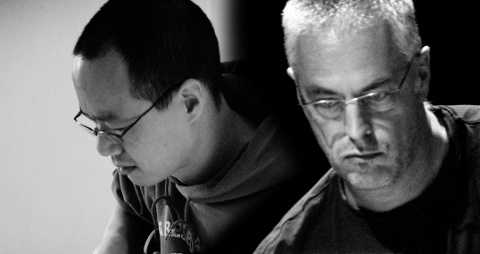
Thursday, May 3, 2012, at 7:30pm: a performance by Numbers (Richard Barrett: electronics; and Han-earl Park: guitar) takes place at Performance Space 2 (University of Hull: Scarborough Campus, Filey Road, Scarborough, England). Admission is £4 (£3).
See the performance diary for up-to-date info. [facebook event…]
about Numbers
Numbers is a high-energy, quick-footed, scatter-brained two hander—a looping, convoluted, interactive dance made audible—a musical fender bender involving electroacoustic complexities and (physio)logical splutter-cuts, jump-cuts and match-cuts—an intense white-knuckle extemporization unit—the duo of composer, performer and electronic musician Richard Barrett and guitarist, improviser and constructor Han-earl Park.
Celebrated for his dense, complex, intricate music, Richard Barrett is perhaps best known for his work with Paul Obermayer as part of FURT, as part of the Evan Parker Electro-Acoustic Ensemble, and his close collaborations with the Elision Ensemble. At home in both composition and improvisation, Barrett’s music increasingly problematizes the distinction between them. Described by Brian Morton as “a musical philosopher… a delightful shape-shifter”, Han-earl Park is drawn to real-time cyborg configurations in which artifacts and bodies collide. He has performed with some of the finest practitioners of improvised music, and is part of Mathilde 253 with Charles Hayward and Ian Smith. First performing together as duo in at AUXXX, Berlin, October 2010, Barrett and Park engage in a continuing improvisative conversation; alternately claiming autonomy and independence, and group action and solidarity.
Their first CD, ‘Numbers’ (CS 201 cd), recorded at the Institute of Sonology (The Hague), was released by Creative Sources Recordings in February 2012. [Details…]
Richard Barrett is internationally active as both composer and improvising performer, and has collaborated with many leading performers in both areas, while developing works and ideas which increasingly leave behind the distinctions between them. His long-term collaborations include the electronic duo FURT which he formed with Paul Obermayer in 1986 (and its more recent octet version fORCH), composing for and performing with the Elision contemporary music group since 1990, and regular appearances with the Evan Parker Electro-Acoustic Ensemble since 2003. Recent projects include “CONSTRUCTION”, a two-hour work for twenty performers and three-dimensional sound system, premiered by Elision in November 2011. He is based in Berlin and currently teaches at the Institute of Sonology in The Hague. His work as composer and performer is documented on over 20 CDs, including five discs devoted to his compositions and seven by FURT.
Improviser, guitarist and constructor Han-earl Park works within/from/around traditions of fuzzily idiomatic, on occasion experimental, mostly open improvised musics, sometimes engineering theater, sometimes inventing ritual. He feels the gravitational pull of collaborative, multi-authored contexts, and has performed in clubs, theaters, art galleries and concert halls in Austria, Denmark, Germany, England, Ireland, The Netherlands, Scotland and the USA.
He is part of Mathilde 253 with Charles Hayward and Ian Smith, and is involved in ongoing collaborations with Bruce Coates, Franziska Schroeder, Alex Fiennes and Murray Campbell. He has recently performed with Ishmael Wadada Leo Smith, Lol Coxhill, Pat Thomas, Paul Dunmall, Mark Sanders, Matana Roberts, Richard Barrett, Pauline Oliveros, Thomas Buckner and Kato Hideki. Festival appearances include Sonorities (Belfast), Sonic Acts (Amsterdam), dialogues festival (Edinburgh), and CEAIT Festival (California). His recordings have been released by labels including Slam Productions and DUNS Limited Edition.
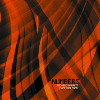
‘Numbers’ (CS 201 cd) is available from Creative Sources Recordings [details…]
Performers: Richard Barrett (electronics) and Han-earl Park (guitar).
© + ℗ 2012 Creative Sources Recordings.
updates
04–30–12: add facebook event page.
performance diary 04-18-12 (Brooklyn, London, New York, Scarborough)
| date | venue | time | details |
|---|---|---|---|
| May 3, 2012 | Performance Space 2 University of Hull: Scarborough Campus Filey Road Scarborough, England |
7:30pm | Performance by Numbers (Richard Barrett: electronics; and Han-earl Park: guitar). Tickets: £4 (£3). [Details…] [facebook event…] |
| May 6, 2012 | Cecil Sharp House 2 Regent’s Park Road Camden London, England |
2:00pm | Performance by Mathilde 253 (Charles Hayward: drums, percussion and melodica; Han-earl Park: guitar; and Ian Smith: trumpet and flugelhorn) as part of Freedom of the City.Also performing: John Edwards, Caroline Kraabel and Lee Patterson; Terry Day; and the London Improvisers Orchestra.[Deatils…] [FOTC page with ticket info…] [facebook event…] |
| May 7, 2012 | The Oxford 256 Kentish Town Road London, England |
9:00pm (doors: 8:30pm) |
Performance by Mark Hanslip (saxophone), Dominic Lash (double bass), Phillip Marks (drums) and Han-earl Park (guitar) presented by Jazz @ The Oxford. Admission: £5. [Details…] [facebook event…] |
| May 27, 2012 | ABC No Rio 156 Rivington Street New York, NY 10002 |
6:00pm | Performance by Nick Didkovsky (guitar), Han-earl Park (guitar) and Catherine Sikora (saxophones) presented by COMA: Citizens Ontological Music Agenda.Also performing: Jim Goodin, Frederika Kreier, and the Rocco John Iacovone ensemble.Admission: $5. [ABC No Rio page…] [facebook event…] |
| July 24, 2012 | The Backroom @ Freddy’s Bar 627 5th Avenue Brooklyn, NY 11215 |
8:30pm | Performance presented by On The Way Out. Details to follow… |
| September 7, 2012 | The Stone 16 Avenue C New York, NY 10009 |
8:00pm | Performance by Tim Perkis (electronics), Han-earl Park (guitar) and Harris Eisenstadt (percussion). Admission: $10. |
| late 2012 | North America | Numbers (Richard Barrett: electronics; and Han-earl Park: guitar) is seeking performance opportunities in North America, late 2012. Interested promoters, venues and sponsors, please get in touch! |
| early 2013 | Europe | Seeking performances in Europe, early 2013 for the cyborg ensemble of interactive, semi-autonomous, technological artifact and machine musician io 0.0.1 beta++ (itself) with human musicians Han-earl Park (guitar), Bruce Coates (saxophones) and Franziska Schroeder (saxophones). Interested promoters, venues and sponsors, please get in touch! [Detailed proposal…] |
Continue reading “performance diary 04-18-12 (Brooklyn, London, New York, Scarborough)”
recording: $100 Guitar Project
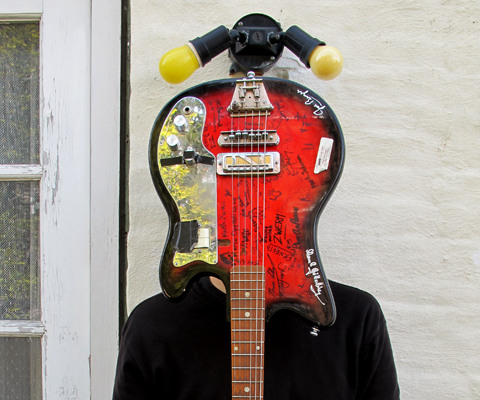
Today, for the $100 Guitar Project, I recorded a sixty-seven second track with the title
apophenia: A atomic symphony in 10 movements
ii you seek
iii a comfortable spot to listen
iv to this
v track the sofa perhaps
vi or the
vii floor however
viii standing hand
ix suspended over the volume
x control you
xi find that
xii it is
“Charmed by its [the $100 guitar’s] no-name vibe and single bridge pickup that looks like an old radio,” Nick Didkovsky and Chuck O’Meara masterminded the $100 Guitar Project which now involves some 68+ guitarists. Bridge Records will release the project as a double CD with royalties to go to CARE. [More about this project…]
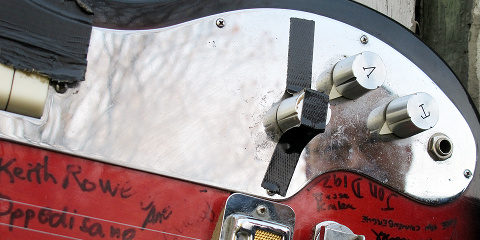
Big thanks to Scott Friedlander for the recording and the photography, and thanks to Nick and Chuck for the invitation to join this project.
audio review: Catherine Sikora, Ian Smith and Han-earl Park (Cork, 04–04–11)
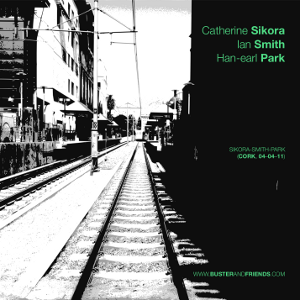
Distant mountain ranges, plateaus and landscapes populate Dave Sumner’s review at Bird is the Worm of the download release by Catherine Sikora, Ian Smith and Han-earl Park:
Han-earl Park has a special place in my music experience. I think, without exception, there has not yet been an opening to any one of his compositions where I have not had an adverse reaction, either repelling me back in my seat or leaving me shaking my head in exasperation of the noise coming out of my speakers. But the thing of it is, without exception, I find myself listening straight through to the final note. Somehow Han-earl Park finds a way to convert my ears to his music one song at a time….
There is no other artist in which I describe this way….
‘Topologically Correct Harry,’ it’s Sikora’s sax that ushers the listener right on in through the front door. Utilizing a pattern of phrasing that gives the impression of outlining a mountain range from a distance, Sikora’s sax is at the center of attention, with Smith’s trumpet searing blemishes of heat on a radar screen as Park’s guitar gurgles and pops just beneath the surface….
‘바르트’ has Ian Smith’s trumpet setting the table and drawing up a spontaneous menu of jab-right-cross combinations. Sikora moves in slow, but once she’s got both feet in the room, her sound expands into wildly arcing phrases that, when combined with Smith’s one-twos, makes for a delicious whirling dervish of sound. Park mostly keeps to the background, picking his spots and letting things develop organically….
‘Red Line Speed’ begins as a slow build that gains momentum along with height. It hits a plateau at the heart of the song, giving the sense of all three instruments feeling around in the dark to figure out the lay of the land before continuing their ascent in the final stretch of the track….
‘Massimo’s Imagined Juxtapositions’ is a lonely streetlight on a deserted midnight avenue, and the instruments are the moths darting in and out of the dim light carved into the darkness.
[Read the rest…] [More about this recording…] [All reviews…]
Also available for download…
audio recordings: Paul Dunmall, Han-earl Park and Mark Sanders (Birmingham, 02–15–11)
audio recordings: Han-earl Park and Richard Scott (Berlin, 10–23–10)
audio recordings: Han-earl Park plus Marian Murray (Cork, 07–29–10)
audio recordings: Han-earl Park and Franziska Schroeder (Cork, 03–26–09)
thanks: Gowanus Company IV at the Douglass Street Music Collective, Brooklyn
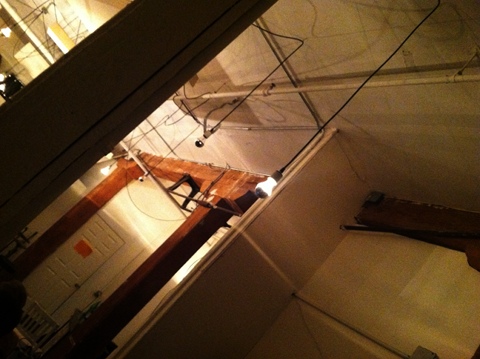
Had a lot of fun being part of Gowanus Company IV at the Douglass Street Music Collective on Sunday (April 8, 2012). Here is, as best as I can recall, the performers who participated at this DB inspired event:
Michael Bates (double bass), Matt Bauder (saxophone and clarinet), Sarah Bernstein (violin), Ken Filiano (double bass), Brad Henkel (trumpet), Ingrid Laubrock (saxophones), Weston Minissali (synthesizer), Han-earl Park (guitar), ‘secret special guest’ (trumpet), Josh Sinton (saxophone and clarinet), Vinnie Sperrazza (drums), Jesse Stacken (piano) and Booker Stardrum (drums).
Thanks to all the performers for allowing me to share the stage with them (next time, Matt, Ken and Ingrid), and big thanks, in particular, to Josh for the invite and putting the whole thing together.
performance: Gowanus Company IV at the Douglass Street Music Collective, Brooklyn

This Sunday (April 8, 2012) at 8:30pm: Han-earl Park will be performing as part of Gowanus Company IV with Michael Bates, Matt Bauder, Ken Filiano, Brad Henkel, Ingrid Laubrock, Weston Minissali, Josh Sinton, Vinnie Sperrazza, Jesse Stacken, Booker Stardrum and “secret, special guests”:
In the spirit of Derek Bailey’s Company week, a once-in-a-lifetime chance to catch several creative musicians playing together who have never played together. [Read the rest…]
The event takes place at the Douglass Street Music Collective (295 Douglass Street, Gowanus, Brooklyn, NY 11217) [map and directions…]. $10 suggested donation.
See the performance diary for up-to-date info. [DSMC page…]
performance diary 04-04-12 (Brooklyn, London, New York, Scarborough)
| date | venue | time | details |
|---|---|---|---|
| April 8, 2012 | Douglass Street Music Collective 295 Douglass Street Gowanus Brooklyn, NY 11217 |
8:30pm | Gowanus Company IV with Michael Bates, Matt Bauder, Ken Filiano, Brad Henkel, Ingrid Laubrock, Weston Minissali, Han-earl Park, Josh Sinton, Vinnie Sperrazza, Jesse Stacken, Booker Stardrum and “secret, special guests”. $10 suggested donation. [Details…] [DSMC page…] |
| May 3, 2012 | Performance Space 2 University of Hull: Scarborough Campus Filey Road Scarborough, England |
7:30pm | Performance by Numbers (Richard Barrett: electronics; and Han-earl Park: guitar). Tickets: £4 (£3). |
| May 6, 2012 | Cecil Sharp House 2 Regent’s Park Road Camden London, England |
2:00pm | Performance by Mathilde 253 (Charles Hayward: drums, percussion and melodica; Han-earl Park: guitar; and Ian Smith: trumpet and flugelhorn) as part of Freedom of the City.Also performing: John Edwards, Caroline Kraabel and Lee Patterson; Terry Day; and the London Improvisers Orchestra.[Deatils…] [FOTC page with ticket info…] |
| May 7, 2012 | The Oxford 256 Kentish Town Road London, England |
9:00pm (doors: 8:30pm) |
Performance by Mark Hanslip (saxophone), Dominic Lash (double bass), Phillip Marks (drums) and Han-earl Park (guitar) presented by Jazz @ The Oxford. Admission: £5. |
| May 27, 2012 | ABC No Rio 156 Rivington Street New York, NY 10002 |
7:00pm | Performance by Nick Didkovsky (guitar), Han-earl Park (guitar) and Catherine Sikora (saxophones) presented by COMA: Citizens Ontological Music Agenda. Further details to follow… Admission: $5. |
| July 24, 2012 | The Backroom @ Freddy’s Bar 627 5th Avenue Brooklyn, NY 11215 |
8:30pm | Performance presented by On The Way Out. Details to follow… |
| September 7, 2012 | The Stone 16 Avenue C New York, NY 10009 |
8:00pm | Performance by Tim Perkis (electronics), Han-earl Park (guitar) and Harris Eisenstadt (percussion). Admission: $10. |
| late 2012 | North America | Numbers (Richard Barrett: electronics; and Han-earl Park: guitar) is seeking performance opportunities in North America, late 2012. Interested promoters, venues and sponsors, please get in touch! |
| early 2013 | Europe | Seeking performances in Europe, early 2013 for the cyborg ensemble of interactive, semi-autonomous, technological artifact and machine musician io 0.0.1 beta++ (itself) with human musicians Han-earl Park (guitar), Bruce Coates (saxophones) and Franziska Schroeder (saxophones). Interested promoters, venues and sponsors, please get in touch! [Detailed proposal…] |
Continue reading “performance diary 04-04-12 (Brooklyn, London, New York, Scarborough)”
reminder: Han-earl Park at the Downtown Music Gallery, New York
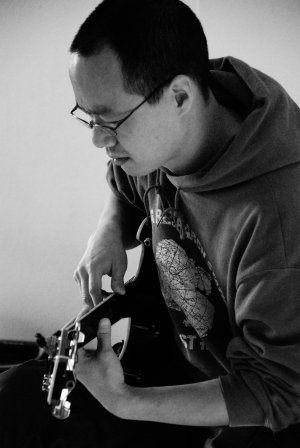
This Sunday (April 1, 2012), at 7:00 pm: a solo set by Han-earl Park (“Solo Electric Guitar from World Traveling Improviser” according to Bruce Lee Gallanter), preceded at 6:00 pm by an ‘April Fool’s Day Mystery Set’ (“Mysterious UK Trumpeter & JOSH SINTON – Baritone Sax”), at the Downtown Music Gallery (13 Monroe Street, New York, NY 10002-7351) [map…]. Free admission. [Details…]
audio recordings: Catherine Sikora, Ian Smith and Han-earl Park (Cork, 04–04–11)

The complete recording of the April 4, 2011 performance by Catherine Sikora (saxophone), Ian Smith (trumpet) and Han-earl Park (guitar) is now available for download. (Special mention to drummer, composer and electronic artist Jeffrey Weeter who couldn’t make the gig, but who, perhaps, is there in the recordings in spirit.) [Bandcamp page…] [Download now…]
Recommended price: €8+
Unlike previous download releases from busterandfriends.com, this one is hosted at Bandcamp, and available as a ‘name your price’ album. Although you can download the recording for free (name €0 as your price) with certain restrictions, please consider paying at least the recommended price. Your generosity will help support the performers and their work. (Many thanks to Alex Fiennes, Corey Mwamba and Anton Hunter for Bandcamp specific advice and support.)
description
A wonderful gem of a recording.
— Philip Coombs (Free Jazz)
There is a new surprise around nearly every corner throughout this often fascinating performance.
— Tom Burris (Free Jazz)
This album rocks.
— Dave Sumner (Bird is the Worm)
A one-of-a-kind improvised musical meeting between artists from Ireland based overseas, and a then Ireland-based artist from abroad which took place on April 4, 2011 at The Roundy, Cork, Ireland.
This was a rare performance in Ireland by Catherine Sikora (New York-based, originally from West Cork), a saxophonist with a striking, compelling sound. She has been described as “a free-blowing player’s player with a spectacular harmonic imagination and an evolved understanding of the tonal palette of the saxophone” (Chris Elliot, Seacoast Online). Sikora was joined by cofounder of the London Improvisers’ Orchestra, trumpeter Ian Smith (London-based, from Dublin), and guitarist Han-earl Park (then Cork-based, currently Brooklyn-based, from California). Smith and Park had just come off the tour as part of the power-trio Mathilde 253 (with Charles Hayward) with the legendary composer-improviser Ishmael Wadada Leo Smith.
personnel
Catherine Sikora (saxophone), Ian Smith (trumpet) and Han-earl Park (guitar).
track listing
Topologically Correct Harry (16:10), 바르트 (8:03), Red Line Speed (24:20), Massimo’s Imagined Juxtapositions (11:40). Total duration: 60:13.
recording details
All music by Catherine Sikora, Ian Smith and Han-earl Park
Recorded live April 4, 2011 at The Roundy, Cork.
Recorded and mixed by Han-earl Park.
Artwork by Han-earl Park.
The recordings (Topologically Correct Harry, 바르트, Red Line Speed, and Massimo’s Imagined Juxtapositions) and artwork released under a Creative Commons Attribution-Noncommercial-No Derivative Works 3.0 Unported License. Please attribute the recordings to Catherine Sikora, Ian Smith and Han-earl Park, and attribute the artwork to Han-earl Park.
about the performers
Since making her way to New York City from West Cork, Ireland to study abstract improvisation, Catherine Sikora has become a well-known face and sound in New York creative music circles. She has worked with Elliott Sharp, Eric Mingus, Michael Evans, Matt Lavelle, Jeremy Bacon, François Grillot and Burnt Sugar The Arkestra Chamber, among many others. Her undeniably unique approach sets her apart from everyone else, even when surrounded by the most original and creative voices in New York City. Sikora is a contributing writer to the book “Silent Solos-Improvisers Speak” (Buddy’s Knife Publishing, Köln, DE) and is currently working on producing a solo recording.
Ian Smith has performed with Evan Parker, John Stevens, Maggie Nicols, Lol Coxhill, Steve Beresford, Eddie Prévost, Greg Tate’s Burnt Sugar Arkestra, Reeves Gabrels, John Sinclair, Harris Eisenstadt and many others. In 2000 he recorded his second CD as a leader, Daybreak, with Derek Bailey, Veryan Weston, Gail Brand and Oren Marshall. His own trio, Trian, has played the London Experimental Music Festival and the Soho Jazz Festival. He also participated in a reformation of Cornelius Cardew’s Scratch Orchestra in 1994. He has collaborated with composer Roger Doyle, winner of the Bourges International Elecro-Acoustic Music Competition, and he has been featured on two instrumental tracks by the hip hop band Marxman. He toured the UK with Butch Morris’ London Skyscraper conduction project. He cofounded the London Improvisers’ Orchestra and The Gathering.
Improviser, guitarist and constructor Han-earl Park works within/from/around traditions of fuzzily idiomatic, on occasion experimental, mostly open improvised musics, sometimes engineering theater, sometimes inventing ritual. He feels the gravitational pull of collaborative, multi-authored contexts, and has performed in clubs, theaters, art galleries and concert halls in Austria, Denmark, Germany, England, Ireland, The Netherlands, Scotland and the USA. He is part of Mathilde 253 with Charles Hayward and Ian Smith, and is involved in ongoing collaborations with Bruce Coates, Franziska Schroeder, Alex Fiennes and Murray Campbell. He has recently performed with Ishmael Wadada Leo Smith, Lol Coxhill, Pat Thomas, Paul Dunmall, Mark Sanders, Matana Roberts, Richard Barrett, Pauline Oliveros, Thomas Buckner and Kato Hideki. Festival appearances include Sonorities (Belfast), Sonic Acts (Amsterdam), dialogues festival (Edinburgh), and CEAIT Festival (California). His recordings have been released by labels including Slam Productions and DUNS Limited Edition.
Also by Han-earl Park and Catherine Sikora
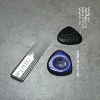
Anomic Aphasia (SLAMCD 559) [details…]
Performers: Han-earl Park (guitar), Catherine Sikora (tenor and soprano saxophones), Nick Didkovsky (guitar), and Josh Sinton (baritone saxophone and bass clarinet).
© 2015 Han-earl Park.
℗ 2015 SLAM Productions.
Also by Han-earl Park and Ian Smith
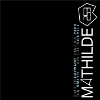
Mathilde 253 (SLAMCD 528) [details…]
Performers: Charles Hayward (drums, percussion and melodica), Han-earl Park (guitar) and Ian Smith (trumpet and flugelhorn) plus Lol Coxhill (saxophone).
© 2010 Han-earl Park.
℗ 2010 SLAM Productions.
Also available for download [more…]
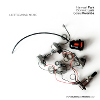
A Little Brittle Music [details…]
Performers: Han-earl Park (guitar), Dominic Lash (double bass) and Corey Mwamba (vibraphone and flute).
© 2015 Han-earl Park. ℗ 2015 Park/Lash/Mwamba.
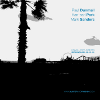
Dunmall-Park-Sanders (Birmingham, 02-15-11) [details…]
Performers: Paul Dunmall (saxophones and bagpipes), Han-earl Park (guitar) and Mark Sanders (drums).
(cc) 2013 Paul Dunmall/Han-earl Park/Mark Sanders.
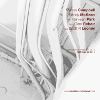
Gargantius Effect +1 +2 +3 (Nor Cal, 08-2011) [details…]
Performers: Murray Campbell (violins, oboe and cor anglais), Randy McKean (saxophone, clarinets and flutes) with Han-earl Park (guitar), plus Gino Robair (energized surfaces, voltage made audible) and Scott R. Looney (hyperpiano).
(cc) 2012 Murray Campbell/Randy McKean/Han-earl Park/Gino Robair/Scott R. Looney.
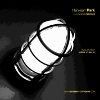
Park+Murray (Cork, 07-29-10) [details…]
Performers: Han-earl Park (guitar) plus Marian Murray (violin).
(cc) 2012 Han-earl Park/Marian Murray.

Jin-Park-Weeter (Cork, 01-24-11) [details…]
Performers: Jin Sangtae (electronics), Han-earl Park (guitar) and Jeffrey Weeter (drums and electronics).
(cc) 2012 Jin Sangtae/Han-earl Park/Jeffrey Weeter.
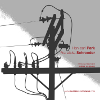
Park-Schroeder (Cork, 03-26-09) [details…]
Performers: Han-earl Park (guitar) and Franziska Schroeder (saxophone).
(cc) 2012 Han-earl Park/Franziska Schroeder.
updates

Anomic Aphasia (SLAMCD 559) [details…]
Performers: Han-earl Park (guitar), Catherine Sikora (tenor and soprano saxophones), Nick Didkovsky (guitar), and Josh Sinton (baritone saxophone and bass clarinet).
© 2015 Han-earl Park.
℗ 2015 SLAM Productions.

Mathilde 253 (SLAMCD 528) [details…]
Performers: Charles Hayward (drums, percussion and melodica), Han-earl Park (guitar) and Ian Smith (trumpet and flugelhorn) plus Lol Coxhill (saxophone).
© 2010 Han-earl Park.
℗ 2010 SLAM Productions.

A Little Brittle Music [details…]
Performers: Han-earl Park (guitar), Dominic Lash (double bass) and Corey Mwamba (vibraphone and flute).
© 2015 Han-earl Park. ℗ 2015 Park/Lash/Mwamba.

Dunmall-Park-Sanders (Birmingham, 02-15-11) [details…]
Performers: Paul Dunmall (saxophones and bagpipes), Han-earl Park (guitar) and Mark Sanders (drums).
(cc) 2013 Paul Dunmall/Han-earl Park/Mark Sanders.

Gargantius Effect +1 +2 +3 (Nor Cal, 08-2011) [details…]
Performers: Murray Campbell (violins, oboe and cor anglais), Randy McKean (saxophone, clarinets and flutes) with Han-earl Park (guitar), plus Gino Robair (energized surfaces, voltage made audible) and Scott R. Looney (hyperpiano).
(cc) 2012 Murray Campbell/Randy McKean/Han-earl Park/Gino Robair/Scott R. Looney.

Park+Murray (Cork, 07-29-10) [details…]
Performers: Han-earl Park (guitar) plus Marian Murray (violin).
(cc) 2012 Han-earl Park/Marian Murray.

Jin-Park-Weeter (Cork, 01-24-11) [details…]
Performers: Jin Sangtae (electronics), Han-earl Park (guitar) and Jeffrey Weeter (drums and electronics).
(cc) 2012 Jin Sangtae/Han-earl Park/Jeffrey Weeter.

Park-Schroeder (Cork, 03-26-09) [details…]
Performers: Han-earl Park (guitar) and Franziska Schroeder (saxophone).
(cc) 2012 Han-earl Park/Franziska Schroeder.
10-24-12: add recommended price and SLAMCD 528 info.
05-20-13: updated the ‘also available for download’ list, and add reviews.
10-07-15: add ‘Anomic Aphasia’ to discography.
11-01-15: add A Little Brittle Music to downloads list, and change currency from USD to EUR.
io 0.0.1 beta++: seeking performances (Europe, 2013)
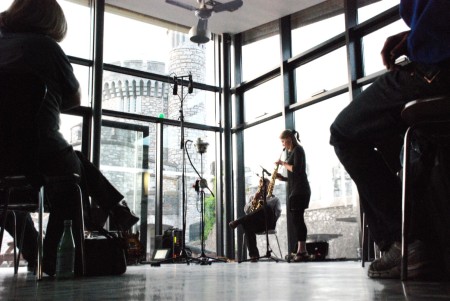
Seeking performance opportunities; particularly in Europe 2014: the cyborg ensemble of interactive, semi-autonomous, technological artifact and machine musician and improviser io 0.0.1 beta++ with human musicians Han-earl Park, Bruce Coates and Franziska Schroeder.
See performance proposal for further information (availability, technical requirements, performers’ biographies, etc.).
overview
This quartet (or faux-quartet, if you prefer) performs demanding free improvisation calling on a range of extended techniques. Pieces of dismantled gestures, destabilizing timbres, and impressive synergy.
François Couture (Monsieur Délire)
An idea that would be pleasing to the Futurists of a century ago, a total hymn to modernity…. The completely improvised session requires a lot of attention from the listener, to be fully repaid by that which is a successful experiment.
Vittorio (MusicZoom)
We watch and listen carefully because we know we’re seeing a kind of manifesto in action. What is an automaton? A sketch, a material characterization of the ideas the inventor and the inventor’s culture have about some aspect of life, and how it could be. io and its kind are alternate beings born of ideas, decisions and choices. It is because io stands alone, an automaton, that the performance recorded on this CD not only is music, but is about music.
Sara Roberts (from the liner notes to SLAMCD 531)
An extraordinary meeting between human and machine improvisers. Featuring the machine musician io 0.0.1 beta++ with guitarist Han-earl Park and saxophonists Bruce Coates and Franziska Schroeder, the performance is part critique and part playful exploration, both a boundary-breaking demonstration of socio-musical technologies and an ironic sci-fi parody.
Constructed by Han-earl Park, io 0.0.1 beta++ is a modern-day musical automaton. It is not an instrument to be played but a non-human artificial musician that performs alongside its human counterparts. io 0.0.1 beta++ representing a personal-political investigation of technology, interaction, improvisation and musicality. It whimsically evokes a 1950s B-movie robot—seemingly jerry-rigged, constructed from ad-hoc components including plumbing, kitchenware, speakers and missile switches—celebrating the material and corporeal.
The performances with this artificial musician highlights society’s entanglement with technology, demonstrates alternative modes of interfacing the musical and the technological, and illuminates the creative and improvisative processes in music. The performance is a radical and playful engagement with powerful and problematic dreams (and nightmares) of the artificial; a dream as old as the anthropology of robots.
The construction of io 0.0.1 beta++ has been made possible by the generous support of the Arts Council of Ireland.
The CD ‘io 0.0.1 beta++’ (SLAMCD 531) was released by SLAM Productions in August 2011.
further information
Web: www.io001b.com
Contact: www.io001b.com/contact
Images: www.io001b.com/images*
Audio: www.io001b.com/samples*
* Additional audio recordings and documentation available on request.
[Full performance proposal…]
[Original post at www.io001b.com…]
updates
11–08–12: change of availability from 2013 to 2014. [More info…]
